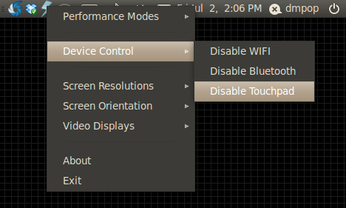Squeeze More Battery Life from Your Linux Netbook with Jupiter

Productivity Sauce
One of the major selling points of Eee PC netbooks is their impressive battery life which is achieved by utilizing the Asus Super Hybrid Engine (SHE) technology. While it's designed to work under Windows, you can take advantage of this technology if you're running a Linux distro on your Eee PC, courtesy of the Jupiter utility. Although this tool is designed primarily for Eee PC netbooks, it works well on pretty much any notebook. So if you want to squeeze as much battery life from your machine as you can, Jupiter is worth a try.
Jupiter's Web site provides DEB and RPM binary packages, so you can easily install the utility on any Linux distro that uses these package formats. If you are installing Jupiter on an Eee PC, you need to install two packages: jupiter and jupiter-support-eee. On any other notebook or netbook, the jupiter package would suffice. Once up and running, Jupiter places a lightning bolt icon in the tray menu. Using the icon, you can quickly switch between different performance modes. Besides that, Jupiter lets you control other aspects of your netbook: you can enable and disable WiFi, Bluetooth, and touchpad (provided Jupiter detects these devices), select a different screen resolution, and switch between internal and external displays.
By default, Jupiter doesn't support keyboard shortcuts, but you can easily add them manually using scripts installed with the utility. The easiest way to do this on Ubuntu is to use the Ubuntu Tweak tool. To create a keyboard shortcut that cycles through the available performance modes, launch Ubuntu Tweak and switch to the Personal | Shortcut Commands section. Select an empty command entry, enter the sudo /usr/lib/jupiter/scripts/cpu-control command in the Command field, specify the desired keyboard shortcut in the Key field, and you're done. You can find a list of supported commands you can use with keyboard shortcuts on the project's Web site.
Comments
comments powered by DisqusSubscribe to our Linux Newsletters
Find Linux and Open Source Jobs
Subscribe to our ADMIN Newsletters
Support Our Work
Linux Magazine content is made possible with support from readers like you. Please consider contributing when you’ve found an article to be beneficial.

News
-
OpenMandriva Lx 6.0 Available for Installation
The latest release of OpenMandriva has arrived with a new kernel, an updated Plasma desktop, and a server edition.
-
TrueNAS 25.04 Arrives with Thousands of Changes
One of the most popular Linux-based NAS solutions has rolled out the latest edition, based on Ubuntu 25.04.
-
Fedora 42 Available with Two New Spins
The latest release from the Fedora Project includes the usual updates, a new kernel, an official KDE Plasma spin, and a new System76 spin.
-
So Long, ArcoLinux
The ArcoLinux distribution is the latest Linux distribution to shut down.
-
What Open Source Pros Look for in a Job Role
Learn what professionals in technical and non-technical roles say is most important when seeking a new position.
-
Asahi Linux Runs into Issues with M4 Support
Due to Apple Silicon changes, the Asahi Linux project is at odds with adding support for the M4 chips.
-
Plasma 6.3.4 Now Available
Although not a major release, Plasma 6.3.4 does fix some bugs and offer a subtle change for the Plasma sidebar.
-
Linux Kernel 6.15 First Release Candidate Now Available
Linux Torvalds has announced that the release candidate for the final release of the Linux 6.15 series is now available.
-
Akamai Will Host kernel.org
The organization dedicated to cloud-based solutions has agreed to host kernel.org to deliver long-term stability for the development team.
-
Linux Kernel 6.14 Released
The latest Linux kernel has arrived with extra Rust support and more.


actually
Social pressure over software choices doesn't accomplish anything, it just makes the community look immature. I would rather have an app that does what I need written in Mono than no app at all. Whining constantly over things as petty as a language choice will just drive people that could make good software off of the platform.
Does it matter if it was built with a Stanley Hammer over Craftsman? No, so grow up and get over it already.
don't have the right
Of course people have the right to moan and complain. That'd be free speech, wouldn't it? It might be argued that it isn't polite, but that's about it. But I think what really bothers certain people is that moaning and complaining might be effective--not so much on any given project, but if everyone consistently moans and complains every time some otherwise cool app turns up written with Mono, people thinking about writing cool little apps will conclude that they'll get lots more kudos and lots less grief if they use something else instead, and Mono will see less use.
It's called social pressure, it's a major way politics is done, and it's perfectly legitimate. There's no ethic that says it's only OK to interact as a passive consumer rather than as an active citizen. This is open source we're talking about here, not buying shrinkwrapped software from Microsoft.
mono? what about Gnome?
It doesnt take...
An alternative without Mono dependencies.
http://greg.geekmind.org/eee-control/
Mono
C# / Mono
Why mono
If the author wanted to code in C#, then Vala would have been a better choice. Vala is similar to C# but is a true compiler. It translates to C then uses Gnu C compiler. Although Vala is thought of in relation to Gnome/GTK, it doesn't have to be. In fact, you can code tiny CLI apps.
Note, the Vala compiler also support Genie, a Python-like syntax.
Read
So, make a choice, already
Requires Mono
Bringing in the whole mono environment on a nettop where disk space is at such a premium (like the 4G SSD drive found on some Eee PCs) is a no-go. That's even completely ignoring the "Is mono free?" argument.